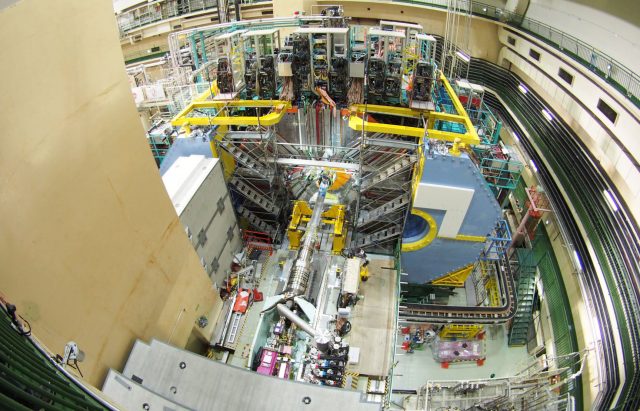
One of the most-anticipated international collaborations in particle physics is the Belle II experiment, which started taking data last year at the KEK national accelerator facility in Tsukuba, Japan. Submitted photo
OXFORD, Miss. –The international search for the fundamental building blocks of all matter is the topic for an upcoming public science forum organized by the University of Mississippi Department of Physics and Astronomy.
The fall semester’s first meeting of the Oxford Science Cafe is set for 6 p.m. Sept. 17 at Uptown Coffee, 265 N. Lamar Blvd. Jake Bennett, UM assistant professor of physics and astronomy, will discuss “Searching for New Particles with the Belle II Detector.” The program is free and open to the public.
The Oxford Science Cafe features monthly conversation about science known and unknown. Speakers and topics are scheduled through the Department of Physics and Astronomy.
“At its heart, experimental physics is concerned with explaining the world around us through the careful acquisition and study of information,” Bennett said. “My particular field, experimental elementary particle physics, is focused on understanding the universe at its most basic level by studying the fundamental building blocks of matter.
“These subatomic particles interact with each other in complex and sometimes very strange ways that make a qualitative description of them rather challenging.”
Scientific collaborations made up of physicists and engineers from all over the world are dedicated to building massive detectors with which to study subatomic particles and their interactions. One of the most-anticipated of these projects is the Belle II experiment, which started taking data last year at the KEK national accelerator facility in Tsukuba, Japan.
Bennett’s 45-minute presentation will explore some of the basic concepts of particle physics, including how Belle II scientists gather information. He will also discuss a few of its more exotic aspects.
“Belle II is designed to record massive amounts of data to allow physicists to study highly suppressed reactions that may give clues to new particles and interactions beyond the Standard Model of particle physics,” he said.
A Science Cafe coordinator said Bennett’s appearance should be most interesting.
“This is a great event for public engagement and one of the few opportunities offered in town to quench their curiosity about the sciences,” said Lorena Magana Zertuche, an Ole Miss graduate student in physics and astronomy. “Dr. Bennett’s presentation is sure to be fascinating and one-of-a-kind, as this will be the first time that we, hopefully, incorporate virtual reality as part of the talk.”
For more information about Oxford Science Cafe programs, go to http://www.phy.olemiss.edu/oxfordsciencecafe. For more information about the Department of Physics and Astronomy, visit http://www.olemiss.edu/depts/physics_and_astronomy or call 662-915-7046.